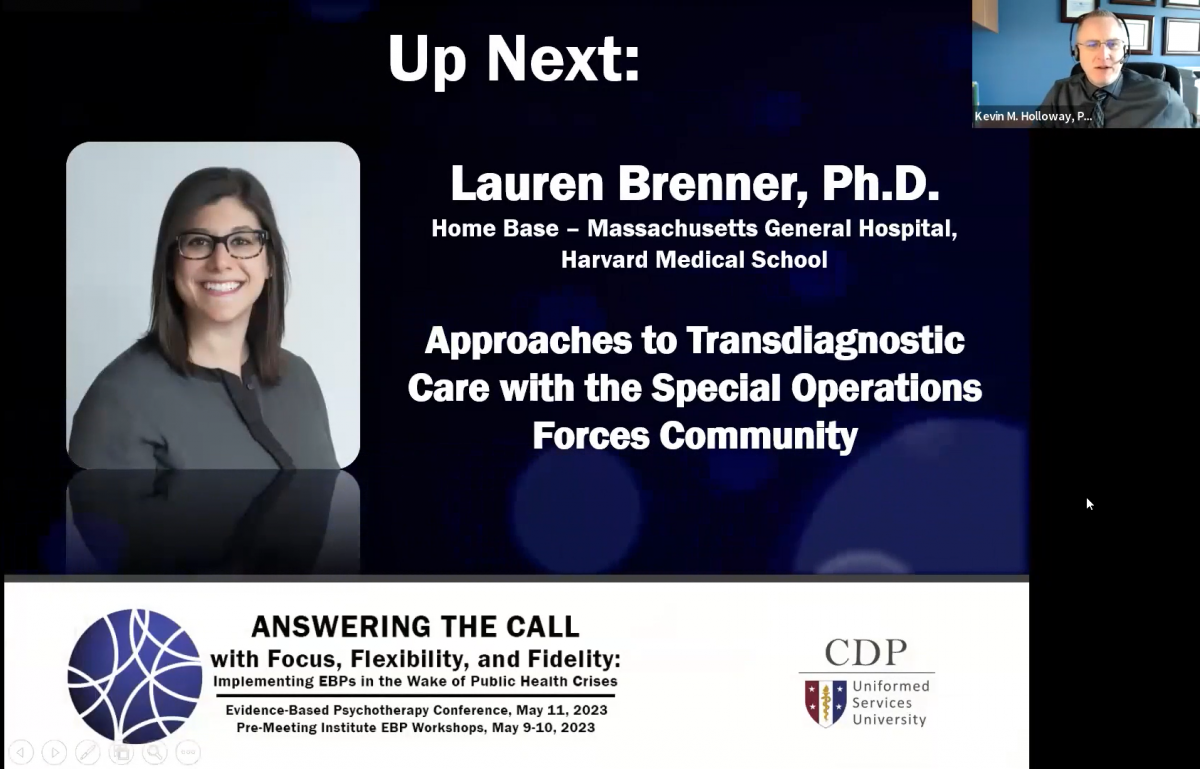The Center for Deployment Psychology hosted our third annual Evidence-Based Psychotherapy conference, online via Zoom, 11 May 2023 with optional pre-meeting institutes: Acceptance and Commitment Therapy, Motivational Interviewing Skills, and Cognitive Behavioral Therapy for Chronic Pain 9-10 May 2023. This year, our theme was Answering the Call with Focus, Flexibility, and Fidelity: Implementing EBPs in the Wake of Public Health Crises.
The EBP Conference is designed for behavioral health providers from all disciplines, including psychologists, psychiatrists, clinical social workers, counselors, marriage and family therapists, and nurse practitioners. The conference should be of particular interest to those involved in the dissemination and implementation of evidence-based psychotherapies, such as internship and resident training directors and faculty, clinical supervisors and consultants, clinic managers, academic instructors who teach other behavioral health providers to provide best practices and evidence-based care as well as front line providers.
If you weren't able to join us for the live event, we are happy to be able to provide recordings of each of the presentations. Click on any of the below titles to view a video of the presentation. Please note, the below recordings are for informational purposes only and do NOT include CE credits.
Click here to visit the 2025 EBP Conference Archive.
Click here to visit the 2024 EBP Conference Archive.
Click here to visit the 2022 EBP Conference Archive.
Click here to visit the 2021 EBP Conference Archive.
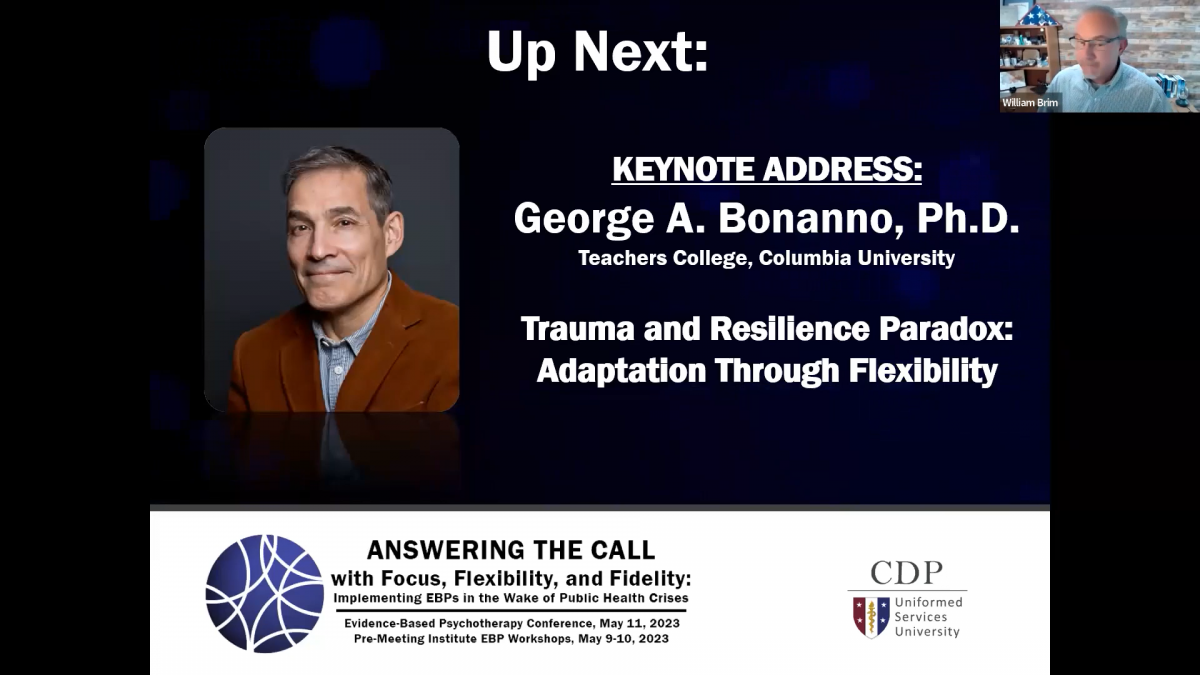 Trauma and the Resilience Paradox: Adaptation Through Flexible Self-Regulation by Dr. George Bonanno, Teachers College, Columbia University:
Trauma and the Resilience Paradox: Adaptation Through Flexible Self-Regulation by Dr. George Bonanno, Teachers College, Columbia University:
Decades of research has shown that response to potentially traumatic events produce various prototypical trajectories of outcome, the most common being a stable trajectory of healthy functioning, or resilience. Paradoxically, correlates of these patterns show uniformly small effects, ( i.e., they say little about who will actually be resilient and who not). Possible explanations for this paradox include the fact that the challenges presented by highly aversive situations are highly variable and that virtually all traits and behavior have both costs and benefits. Thus, what works in one situation may not work as well, or may even be harmful, in another. How can people solve this paradox and find their way to resilience? The answer, I propose in this keynote address, is through the process of flexible self- regulation. In addition to a detailed elaboration on this process, recent studies and new directions on regulatory flexibility will also be reviewed. Read more...
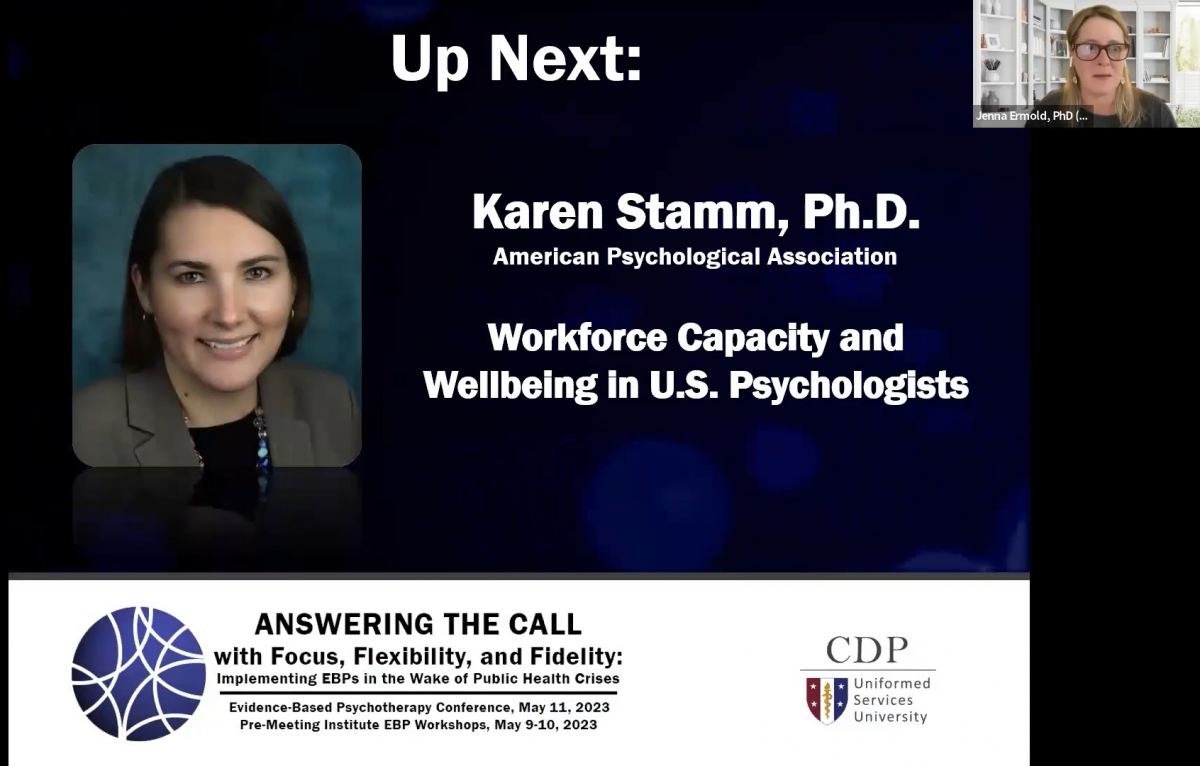 Workforce Capacity and Wellbeing in U.S. Psychologists By Dr. Karen Stamm, American Psychological Association: This program will cover two research topics in the psychologist workforce: supply and demand projections and psychologist workload, wellbeing, and burnout. Pre-COVID-19 workforce projections indicated the psychologist workforce is inadequately sized and prepared to respond to population health needs. A racial/ethnic equivalence scenario suggested the size of the workforce would need to increase dramatically in order to achieve racial/ethnic equity. Changes in demand vary across age and racial/ethnic groups. In particular, increases in demand are projected from older adults and Hispanic populations. Yet the psychologist workforce only had small numbers of psychologists with specialty training to work with older adults. Similarly, only small numbers of psychologists were Hispanic or able to provide services in Spanish. The program will also describe key survey findings on how psychological practice evolved because of the COVID-19 pandemic. Workload increased while burnout remained persistently high. An increasing percentage of psychologists reported they were unable to meet demand for treatment from their patients. Despite challenges in managing workload capacity, psychologists used methods for maintaining wellness, such as practicing self-care, having a positive work-life balance, and seeking peer consultation/support. Strategies for addressing burnout in the behavioral health workforce will be discussed. Organizational-level interventions can be effective in addressing the contributing factors to burnout in behavioral health providers. Read more...
Workforce Capacity and Wellbeing in U.S. Psychologists By Dr. Karen Stamm, American Psychological Association: This program will cover two research topics in the psychologist workforce: supply and demand projections and psychologist workload, wellbeing, and burnout. Pre-COVID-19 workforce projections indicated the psychologist workforce is inadequately sized and prepared to respond to population health needs. A racial/ethnic equivalence scenario suggested the size of the workforce would need to increase dramatically in order to achieve racial/ethnic equity. Changes in demand vary across age and racial/ethnic groups. In particular, increases in demand are projected from older adults and Hispanic populations. Yet the psychologist workforce only had small numbers of psychologists with specialty training to work with older adults. Similarly, only small numbers of psychologists were Hispanic or able to provide services in Spanish. The program will also describe key survey findings on how psychological practice evolved because of the COVID-19 pandemic. Workload increased while burnout remained persistently high. An increasing percentage of psychologists reported they were unable to meet demand for treatment from their patients. Despite challenges in managing workload capacity, psychologists used methods for maintaining wellness, such as practicing self-care, having a positive work-life balance, and seeking peer consultation/support. Strategies for addressing burnout in the behavioral health workforce will be discussed. Organizational-level interventions can be effective in addressing the contributing factors to burnout in behavioral health providers. Read more...
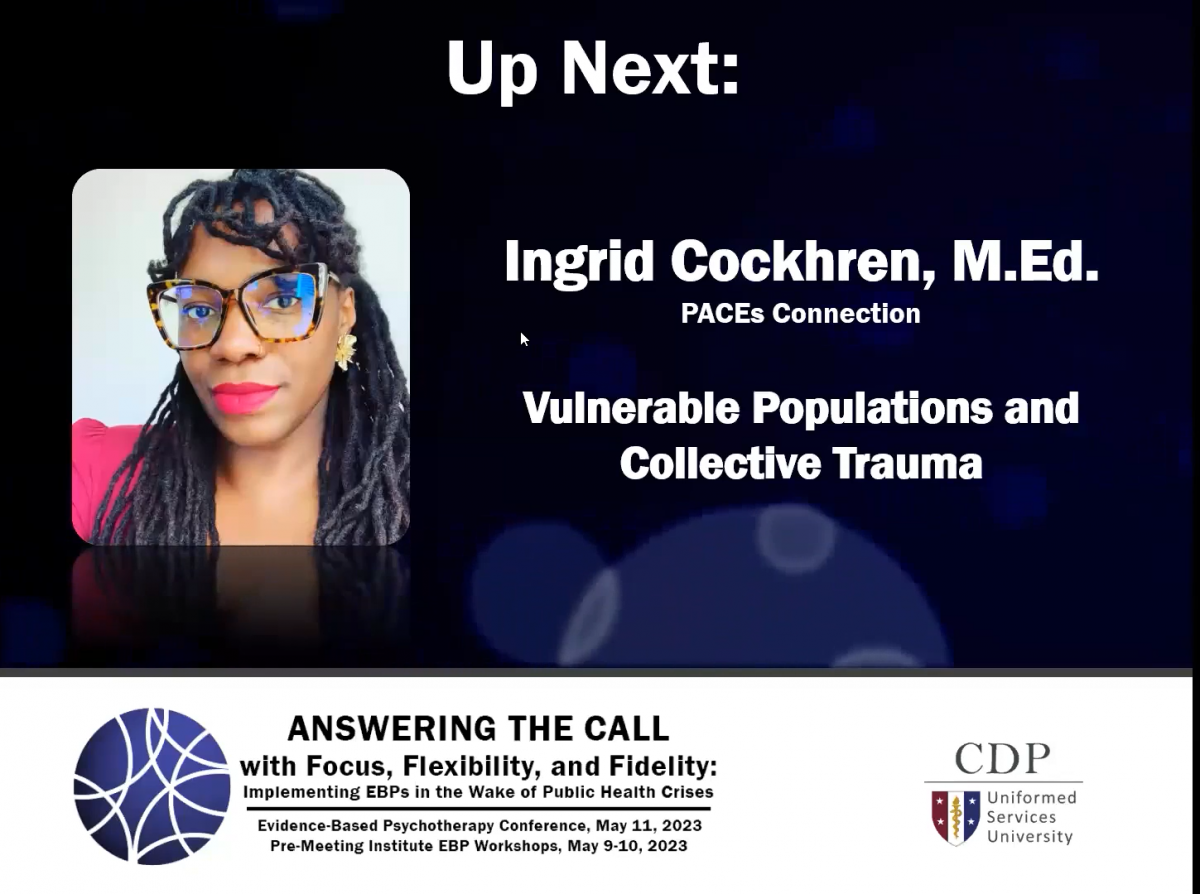 Vulnerable Populations & Collective Trauma by Ingrid Cockhren, M.Ed, PACEs Connections.: The presentation will explore the concept of collective trauma through a social-ecological framework. It will also outline the mechanisms of intergenerational transmission of trauma and historical trauma. The purpose of this presentation is to identify populations and identities that are more susceptible to the negative outcomes associated with collectively traumatic experiences (COVID-19, climate disasters, etc.) and to provide best practices to serve those populations.
Vulnerable Populations & Collective Trauma by Ingrid Cockhren, M.Ed, PACEs Connections.: The presentation will explore the concept of collective trauma through a social-ecological framework. It will also outline the mechanisms of intergenerational transmission of trauma and historical trauma. The purpose of this presentation is to identify populations and identities that are more susceptible to the negative outcomes associated with collectively traumatic experiences (COVID-19, climate disasters, etc.) and to provide best practices to serve those populations.
Read more...
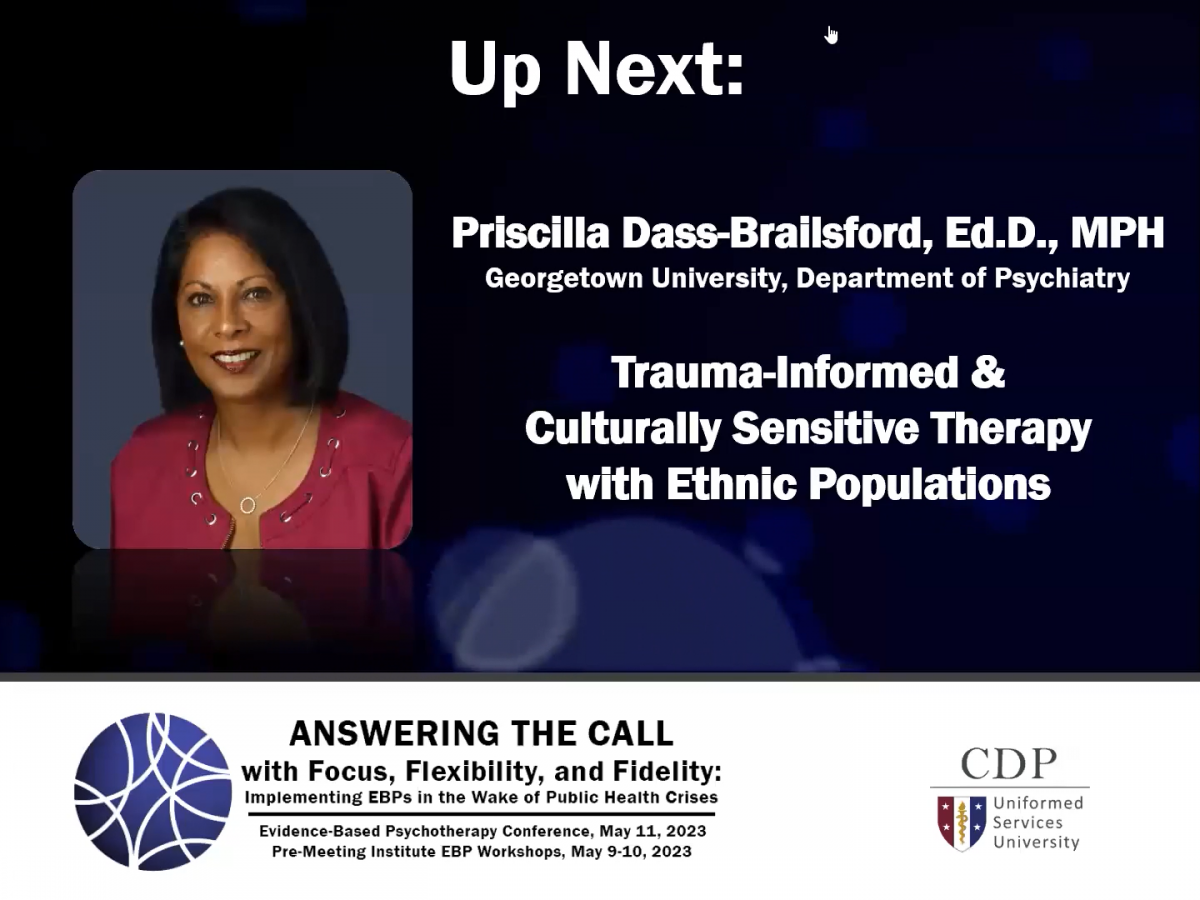 Trauma-Informed & Culturally Sensitive Therapy with Ethnic Populations by Dr. Priscilla Dass-Brailsford, Georgetown University: This presentation highlights trauma-focused mental health approaches that can be used with ethnic populations. The focus of the presentation is on current theoretical perspectives and evidence-based methods that provide a paradigm for culturally and ecologically appropriate interventions, attentive to the diverse needs of people affected by traumatic experiences.
Trauma-Informed & Culturally Sensitive Therapy with Ethnic Populations by Dr. Priscilla Dass-Brailsford, Georgetown University: This presentation highlights trauma-focused mental health approaches that can be used with ethnic populations. The focus of the presentation is on current theoretical perspectives and evidence-based methods that provide a paradigm for culturally and ecologically appropriate interventions, attentive to the diverse needs of people affected by traumatic experiences.
Read more...
Approaches to Transdiagnostic Care with the Special Operations Forces Community by Dr. Lauren Brenner, Home Base: Limited research has been conducted with this population examining psychiatric concerns and the impact of cumulative trauma. Prior research has often relied on self-report data, retroactive data, or repository searches to artificially formulate diagnoses and classify these individuals, leading to inaccurate diagnoses and subsequent ineffectively designed treatment. Given the high rates of medical and psychiatric comorbidities in this population, the importance of accurate assessment and comprehensive treatment is imperative. In conducting nearly 300 structured diagnostic interviews, and treating over 100 operators, observations have been gathered on the cumulative impact of trauma, relationship to psychiatric diagnoses, and recommendations for treatment approaches. This presentation will provide specific treatment and evaluation recommendations based on current, evidence-based interventions such as Cognitive Behavioral Therapy, Acceptance-Based Behavioral Therapies, and exposure techniques. Additional information about the program offerings at Home Base for the SOF community will be highlighted, including outcomes of these programs. Given the widespread healthcare utilization of the SOF community, both within and outside the Veterans Affairs System, presenting these findings to a national and international audience will vastly improve cultural competency and improve best practices in providing effective care to this population. Read more...
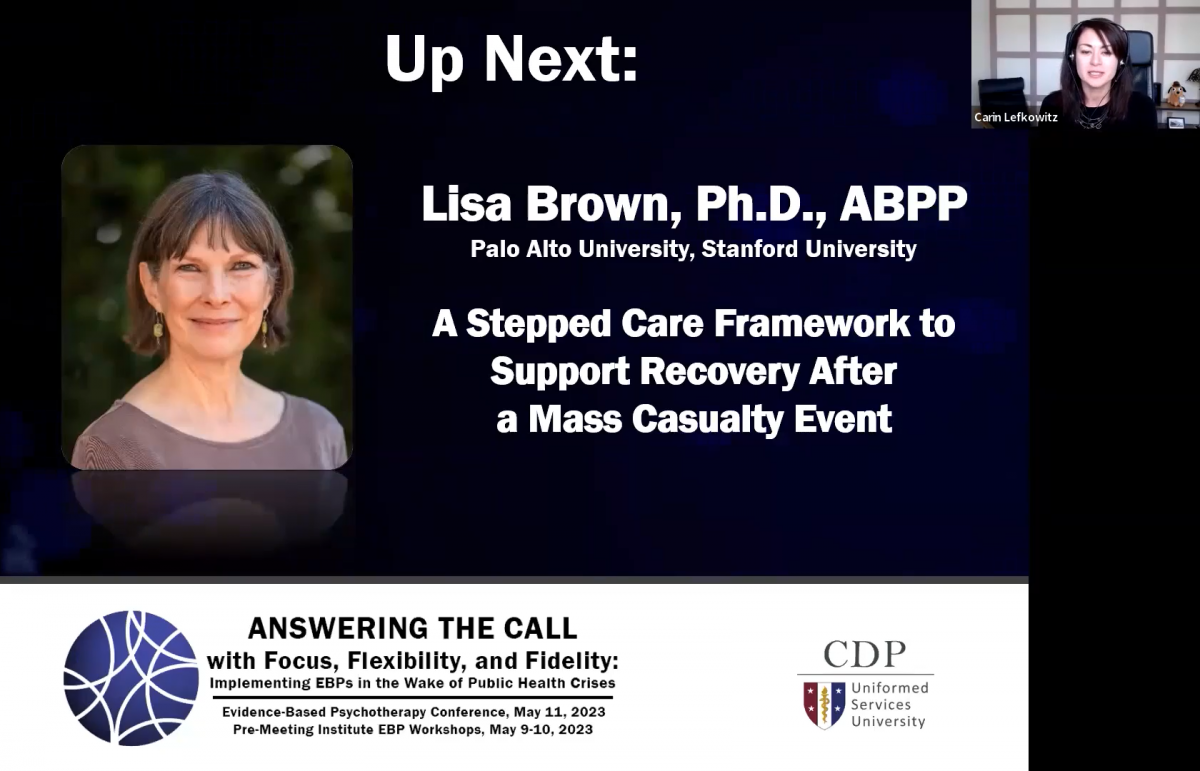 A Stepped Care Framework to Support Recovery after a Mass Casualty Event by Dr. Lisa Brown, Palo Alto University, Stanford University: The development of interventions for mass casualty events became a priority for mental health providers and national agencies responsible for delivering behavioral health care after the 9/11 terrorist attacks on the United States. Mass casualty events have not abated during the past two decades, as mass shootings have risen more than tenfold from 3 incidents in 2000 to 40 incidents in 2020. Soft targets, such as houses of worship, schools, trains, outdoor concerts, and shopping malls, remain easier to attack than hard targets with a prepared security presence, like airports and athletic events. For those in harm's way, first responders and behavioral health clinicians are thrust into taking action to provide care to those who are physically wounded or mentally traumatized. This clinical practice program offers an overview of the challenges and considerations when providing mental health care after a mass casualty event. Most current approaches advocate for using a stepped care model or a phased delivery of care. This presentation will share various approaches to screening, intervention, assessment, and treatment that are based on current research, lessons learned, and best practices.. Read more...
A Stepped Care Framework to Support Recovery after a Mass Casualty Event by Dr. Lisa Brown, Palo Alto University, Stanford University: The development of interventions for mass casualty events became a priority for mental health providers and national agencies responsible for delivering behavioral health care after the 9/11 terrorist attacks on the United States. Mass casualty events have not abated during the past two decades, as mass shootings have risen more than tenfold from 3 incidents in 2000 to 40 incidents in 2020. Soft targets, such as houses of worship, schools, trains, outdoor concerts, and shopping malls, remain easier to attack than hard targets with a prepared security presence, like airports and athletic events. For those in harm's way, first responders and behavioral health clinicians are thrust into taking action to provide care to those who are physically wounded or mentally traumatized. This clinical practice program offers an overview of the challenges and considerations when providing mental health care after a mass casualty event. Most current approaches advocate for using a stepped care model or a phased delivery of care. This presentation will share various approaches to screening, intervention, assessment, and treatment that are based on current research, lessons learned, and best practices.. Read more...
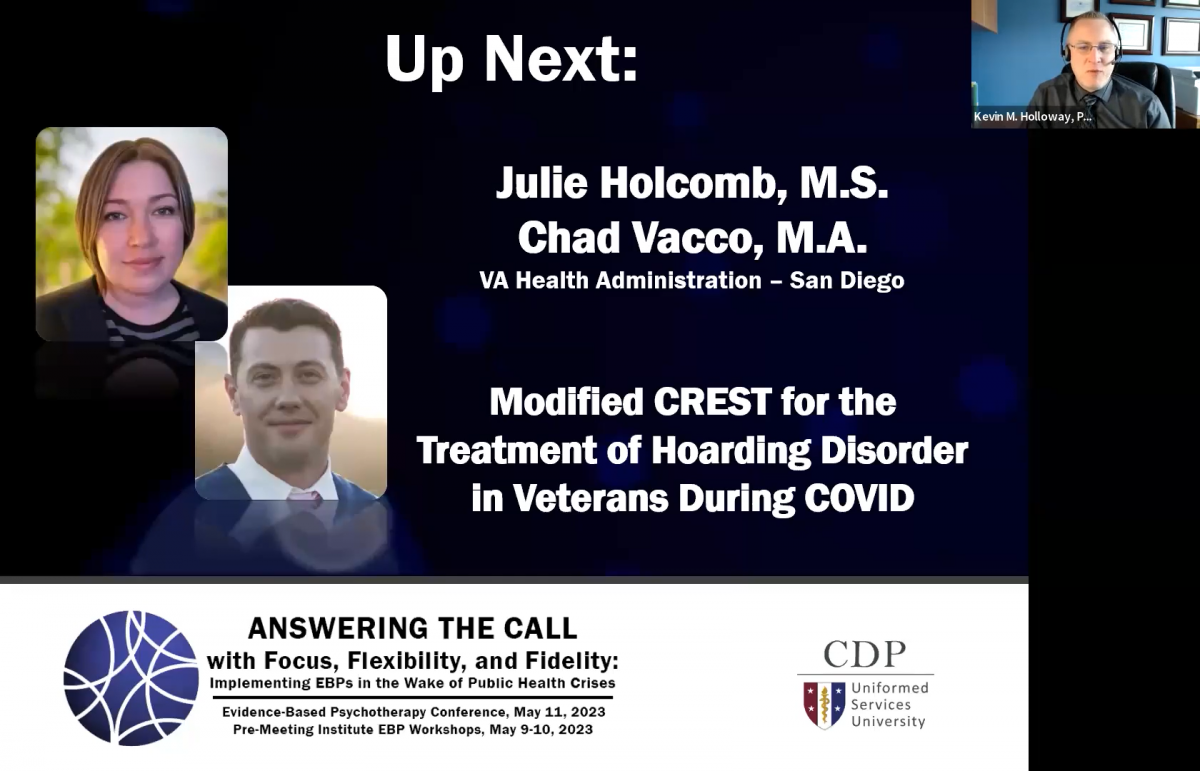 Modified CREST for the treatment of hoarding disorder in veterans during COVID by Julie Holcomb, M.S. & Chad Vacco, M.A., VA Health Administration - San Diego: Hoarding Disorder (HD) is a chronic and debilitating psychiatric condition that leads to devastating personal consequences and significant healthcare costs. Epidemiological reports estimate the prevalence of clinically significant hoarding symptoms at 7%, while almost 20% of the US population report difficulty discarding ‘worn out’ or ‘useless’ items. This can be problematic when combined with many of the additional challenges certain populations face, including severe functional impairment, medical and psychiatric comorbidities, and cognitive dysfunction. For many Americans, the COVID health crisis introduced or worsened feelings of fear and anxiety that only exacerbated the severity of HD. A strong association was found between panic buying at the start of COVID (toilet paper, non- perishables, etc.) and subsequent hoarding behaviors, with intolerance to uncertainty—a hallmark of COVID—having a key relationship to increased hoarding symptom severity.
Modified CREST for the treatment of hoarding disorder in veterans during COVID by Julie Holcomb, M.S. & Chad Vacco, M.A., VA Health Administration - San Diego: Hoarding Disorder (HD) is a chronic and debilitating psychiatric condition that leads to devastating personal consequences and significant healthcare costs. Epidemiological reports estimate the prevalence of clinically significant hoarding symptoms at 7%, while almost 20% of the US population report difficulty discarding ‘worn out’ or ‘useless’ items. This can be problematic when combined with many of the additional challenges certain populations face, including severe functional impairment, medical and psychiatric comorbidities, and cognitive dysfunction. For many Americans, the COVID health crisis introduced or worsened feelings of fear and anxiety that only exacerbated the severity of HD. A strong association was found between panic buying at the start of COVID (toilet paper, non- perishables, etc.) and subsequent hoarding behaviors, with intolerance to uncertainty—a hallmark of COVID—having a key relationship to increased hoarding symptom severity.
These trends have also become evident in the clinical setting. Over the past three years, our programs have accumulated a wait list of more than 550 potential participants seeking treatment for HD who did not qualify for other available research programs (Veteran status or low-income). A growing body of research demonstrates higher rates of mental health challenges for Veterans, including hoarding challenges when compared to the typical populace. Unfortunately, Veterans with HD are chronically underdiagnosed and do not receive evidence-based treatment. To address this need, the Department of Veterans Affairs has funded a series of research grants geared toward developing and testing evidence-based treatments.
Cognitive Rehabilitation and Exposure/Sorting Therapy (CREST) is a proven, evidence-based treatment that addresses neurocognitive weaknesses that may contribute to HD while targeting the core symptoms of urges to save and avoidance of discarding that lead to the accumulation of clutter. Thus, delivering CREST to a vulnerable population with multiple comorbidities has proven successful. Modifications in response to COVID include adapting CREST for virtual delivery. A total of 270 virtual sessions of CREST were successfully delivered over a three-month period to low-income older adults with HD through a County-funded program. Our six therapists rated using virtual care “easy” to “very easy” on a 5-point Likert scale. Clinical outcomes included the ability to navigate spaces without tripping/falling, sleeping in a bed, using rooms as they were intended, and using appliances. Feedback from therapists included less cancelations, more willingness to engage, decreases in session/administrative time, and that clients were “proud that they could learn to use technology” in response to solicited feedback about virtual sessions. Our group has also since modified the course of treatment to make the program more time efficient. Initially, we started out with one session per week for 26 sessions.
However, the length of the program (6-8 months) burdens mental health clinics with demands for additional staff time and financial resources. To address these implementation barriers, we developed a novel approach to CREST referred to as Personalized CREST. It is still implemented virtually, but it can be administered in half of the time with the same degree of effectiveness (according to preliminary data). This is the current treatment plan we are using to compare CREST effectiveness with standard Case Management in Veterans with HD. By introducing strategies like these to help reduce patient and provider burden, we can more efficiently and effectively interrupt the trajectory of this and other chronic and debilitating conditions. Read more...

